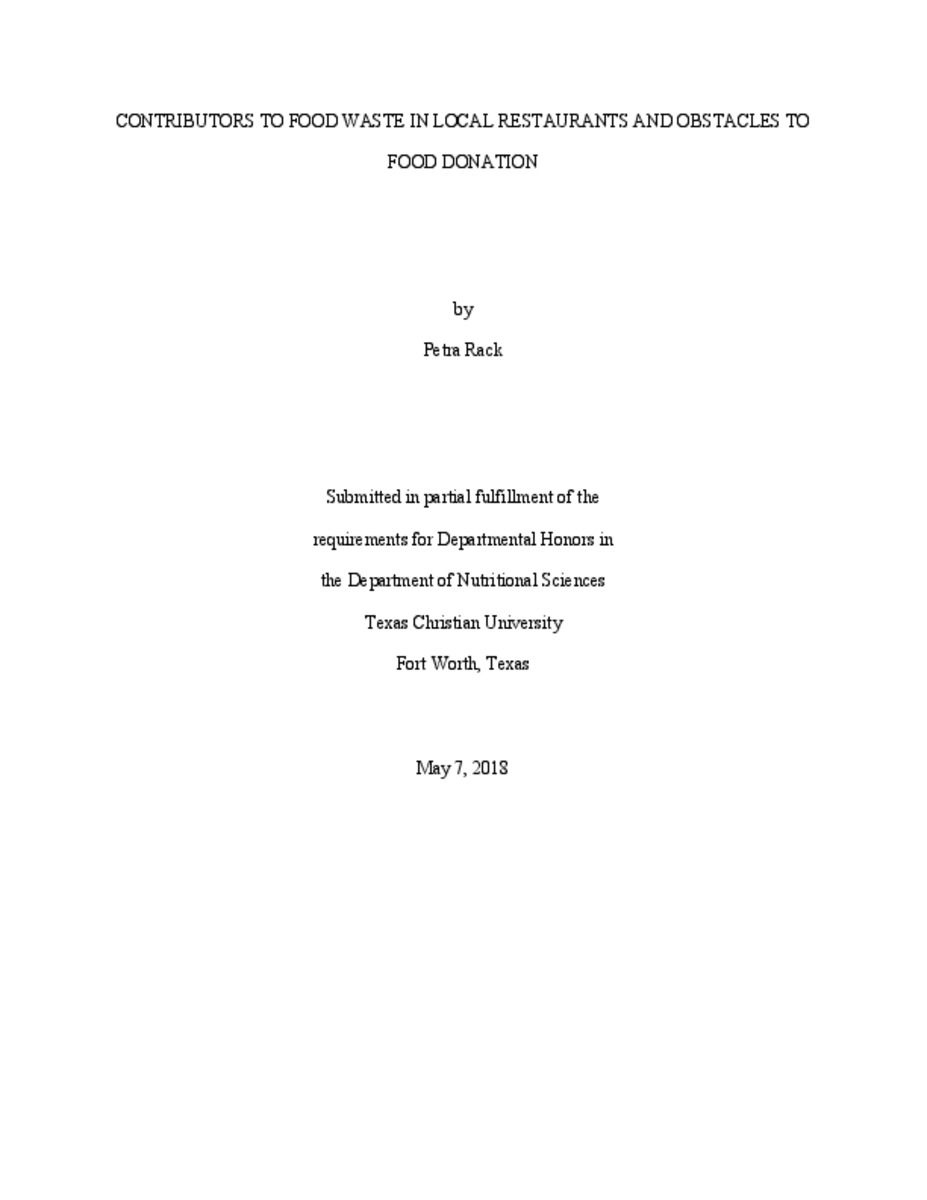Contributors to Food Waste in Local Restaurants and Obstacles to Food DonationShow full item record
| Title | Contributors to Food Waste in Local Restaurants and Obstacles to Food Donation |
|---|---|
| Author | Rack, Petra |
| Date | 2018 |
| Abstract | Background: Approximately one-third of all food produced in America is wasted each year due to lack of infrastructure and support in waste-saving efforts. With over 49 million Americans food insecure, more attention needs to be drawn towards implications of food waste (Vogliano). Methods: An electronic food waste survey was developed and emailed to local Fort Worth restaurants after recruiting through phone calls and in person interactions. An electronic food donation survey was sent via email to local homeless shelters after recruiting through phone calls. Twelve restaurant respondents and fourteen homeless shelter responses were entered into Statistical Package for the Social Sciences version 22 (SPSS), where frequencies and correlations were determined. Results: Eighty-three percent of restaurant survey respondents were not concerned about food waste in their establishment, but 100% agreed that reducing food waste was important. There was a positive correlation (p < .05) between restaurants having knowledge of the Good Samaritan Act and believing they have successful food waste prevention measures. There was a positive correlation (p < .01) between concerns of expiration and adequate storage space for prepared food in respondents to the shelter food donation survey. Only 17% of restaurant survey respondents said they would not be interested in connecting with local shelters to donate food. Eighty-one percent of shelter respondents agreed that their shelters would benefit from excess food donations from restaurants. Discussion: All restaurants believed food waste is important, but 83% were not concerned about it in their restaurant. Restaurants with successful food waste measures in place might have been more likely to respond to the survey. Most respondents to both the shelter and restaurant surveys agreed that partnerships between restaurants and shelters for safe excess food donation would be beneficial. Conclusion: Food waste is prevalent in the restaurant industry and reallocating excess food, as donations to shelters, would be beneficial for society. Word count: 307 |
| Link | https://repository.tcu.edu/handle/116099117/22365 |
| Department | Nutritional Sciences |
| Advisor | Jarman Hill, Gina |
| Additional Date(s) | 2018-05-19 |
Files in this item
This item appears in the following Collection(s)
- Undergraduate Honors Papers [1362]
Related items
Showing a few items related by title, author, creator and subject.
-
For I was hungry and you gave me food: pragmatics of food access in the Gospel of Matthew
Wilson, Carol Bakker (2012)The first-century Roman East experienced endemic food shortages that left 25 per cent of the population below subsistence level and another 30 per cent at risk of slipping below subsistence. In addition to endemic shortages, ... -
Tempting Foods and the Junk Food Myth
Baskett, Kaily (2015)One roadblock to healthy eating is the belief that healthy foods are more expensive than foods with added fats and sugars. However, much evidence suggests that healthy eating is actually less expensive (Carlson & Frazoa, ... -
Food For Thought
Maples, Harold, 1925- (1961-02-06)
© TCU Library 2015 | Contact Special Collections |
HTML Sitemap






